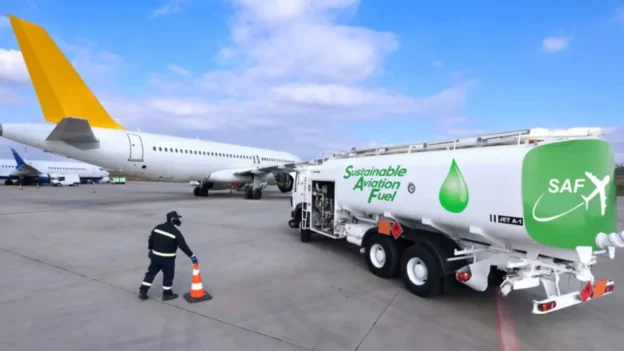Syzygy Plasmonics has announced the deployment of its first NovaSAF-1 modular plant in Durazno, Uruguay. This facility, which will produce PBS with biogas and renewable energy, will use Honeywell UOP’s Unicracking hydrocracking technology, a proven solution with more than 70 years of evolution.
Transformation of dairy waste into PBS with biogas
The NovaSAF-1 plant is designed to convert dairy waste into PBS through a process that eliminates combustion by a process that eliminates combustion, thereby significantly reducing emissions associated with the manufacture of fuels. fuel manufacturing..
With a projected capacity of more than 350,000 gallons per year, the project not only sets a precedent for Latin America, but also seeks to become a replicable model for more than 50,000 biogas plants worldwide.
A scalable and profitable model
The combination of Syzygy’s modular architecture and the efficiency of the technology Fischer-Tropsch technology technology allows the production process to be installed quickly and with lower financial risks. This is essential in a market where the availability of traditional raw materials for PBS remains limited.
Trevor Best, CEO of Syzygy, noted that the company’s approach allows it to achieve price competitiveness close to Jet-A fuel under the right conditions.
The NovaSAF platform can produce large volumes of PBS in a cost-effective manner, taking advantage of abundant waste streams and clean energy.
He stated.
Production of PBS with biogas from dairy wastes
The joint venture between Honeywell and Syzygy aims to solve two of the biggest challenges for the expansion of PFS: production cost and feedstock flexibility. Honeywell, through its UOP division, offers solutions that allow operating with a wide range of sources, accelerating the adoption of low carbon footprint fuels.
The integration of our technology with Syzygy’s modular system demonstrates how PBS production can be scaled up in a viable and sustainable manner.
According to Rajesh Gattupalli, president of Honeywell UOP
Honeywell has also developed modular solutions that enable reduced deployment times in refineries and chemical plants, further enhancing its contribution to the global energy transition.
Projection and international context
The International Energy Agency estimates that, by 2030, more than 40% of biofuels will come from waste and non-food crops. Initiatives such as NovaSAF-1 reinforce this projection by providing a scalable pathway to diversify the supply of biofuels. supply of PBS without competing with food crops.
With this alliance, Syzygy and Honeywell not only push the boundaries of energy technology, but also set a precedent for the future of clean fuels in aviation.
Source and photo: Honeywell

